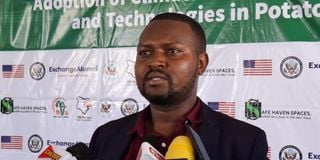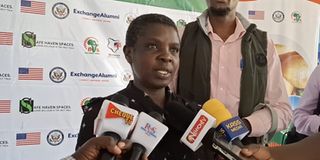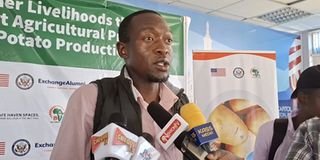Nakuru potato farmers receive climate-smart training to tackle challenges of climate change

Simon Nyaga, the Executive Director of Bold Impact Africa during an interview on October 11, 2024.
Potato farmers in Nakuru are grappling with dwindling production due to the worsening effects of climate change.
Mary Kahenya, a potato farmer in Njokerio, Njoro sub-county, laments how she lost her produce due to extreme rains and droughts.
"As the weather patterns continue to change, it has affected our production as potato farmers. Sometimes we plant our crop and it rains too much, and even though we use agrochemicals to prevent disease, the crop still goes bad. Other times, the sun is too hot and our produce spoils prematurely," Ms Kahenya says.

Mary Kahenya, a potato farmer in Njokerio, Njoro sub-county, during an interview on October 11, 2024.
This unpredictability, she explains, has had a significant impact on her productivity and therefore her income.
Her counterpart, Aziz Kahoro, a mixed farmer who is a person with disiability, growing maize, beans and potatoes, faces similar challenges.
"Our biggest struggle is adapting to these erratic weather patterns. One season it's floods, the next it's drought. It's becoming increasingly difficult to plan our planting and harvesting cycles," says Mr Kahoro.

Aziz Kahoro, a mixed farmer who cultivates maize, beans, and potatoes during an interview on October 11, 2024.
He adds that farmers also struggle with access to certified seeds, noting that many save their seeds from previous harvests.
However, through the Promoting Inclusive Farmer Livelihoods through Climate Smart Agricultural Practices in Potato Production project, these two are among 50 other farmers who will benefit from this initiative, which aims to support farmers by introducing climate-smart agricultural practices specifically tailored to potato production and people living with disabilities (PWDs).
For Mr Kahoro, this is a big step towards improving the lives of PWDs, stressing that if the certified seeds produce high yields, farmers will be able to increase their incomes, which will improve other aspects of their lives.
"In addition, this is an opportunity for farmers living with disabilities to recognise themselves and that they too can make a positive contribution to society," he says.
"The project will provide farmers with training, seeds of drought-resistant potato varieties and sustainable soil testing methods to improve their yields," says Simon Nyaga, Executive Director of Bold Impact Africa.
The Nakuru 2021 Mandela Washington Fellowship alumnus adds that it is also a big step in promoting the inclusion of people with disabilities in agriculture, ensuring they can thrive in a changing climate and have equal access to resources and training.
"Often people with disabilities are left behind when it comes to production issues. We are trying to change the narrative by empowering them to start agribusiness ventures in the potato value chain so that they can lead successful and sustainable lives."

